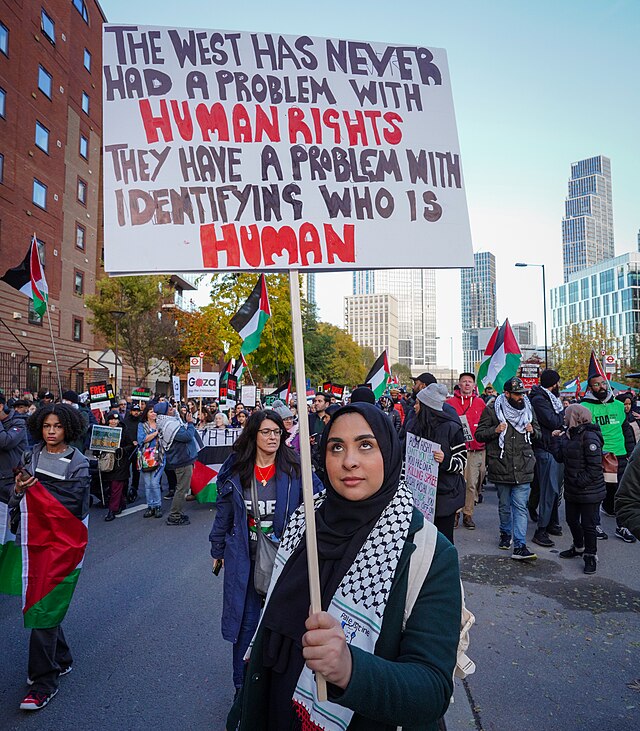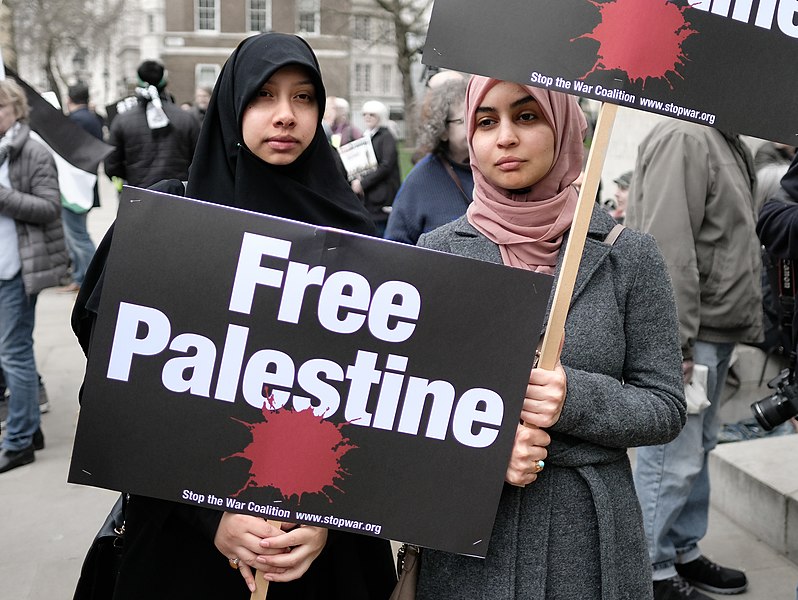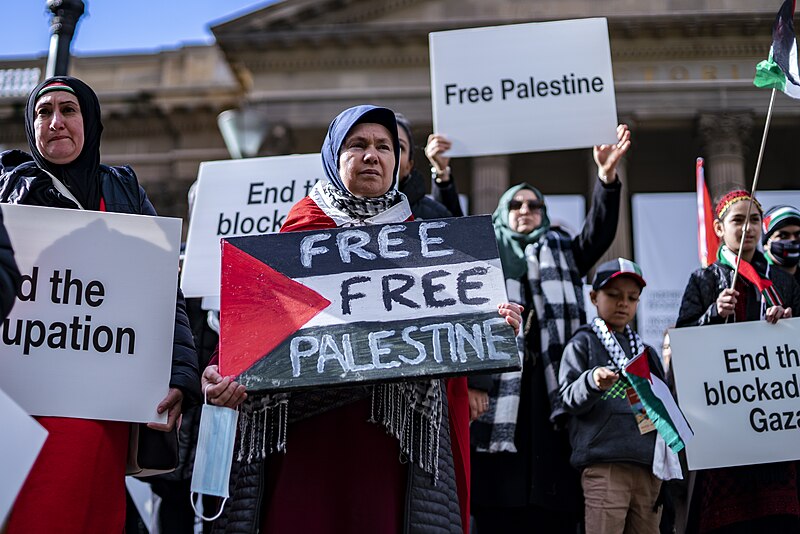 Sabrina Galella, an Italian migrant living in Scotland and human rights practitioner, explains why the war in Palestine is a feminist issue.
Sabrina Galella, an Italian migrant living in Scotland and human rights practitioner, explains why the war in Palestine is a feminist issue.

Sabrina Galella / Migrant Women Press*![]()
I am not Palestinian. I am not Arab. I am not Muslim.
Is it even my place to talk about the war on Gaza?
I only know of the discrimination that comes with being a migrant, the exclusion that comes from financial hardship, and the harassment, too often sexual, that comes with being a woman.
I write from the comfort of my home, sitting in privilege and drinking hot chamomile to soothe the pain of my period.
I am a migrant, one who chose to leave and has the freedom to go back at any time. I am a woman enjoying the full autonomy of my sexual and reproductive rights.
I am a human rights defender, free – almost completely – from the risk of arbitrary detention, ill-treatment, violence, rape, and death. And yet, I am cautious writing about the genocide in Gaza; I don’t want to offend people by taking a space that is not mine or by staying silent when we should be screaming from the top of our lungs, “Free Palestine”.
But this silence is costing lives, and I want to talk about the women, the girls, the gender-based violence, the rape, the starvation.
I want to talk about it because I am a feminist, and the genocide in Gaza is a feminist issue – but Western feminism has failed to stand in solidarity with our sisters in Gaza and has chosen silence instead, hoping to disguise it as neutral.
Why wars and conflicts are feminist issues?
It is a well-known fact that conflicts bring higher levels of gendered-based violence, access to reproductive and health care is disrupted, sexual violence is used as a weapon, and the risk of trafficking is higher, together with food insecurity and displacement.
Women remain the minority of combatants and perpetrators of war, suffer the worst harm, together with children, and yet they have historically been left out of peace agreements.

Only in 2000, following decades of lobbying by women’s rights activists, the UN Security Council passed unanimously resolution 1325, ensuring women’s full participation in conflict resolution and peace negotiations.
That is why wars and conflicts become feminist issues, because they perpetuate and amplify gender inequality. Gaza, unfortunately, is no exception to that rule.
And yet, there has not been an outcry for the plight of women and girls in Gaza. There was condemnation, possibly too late, of the sexual violence against Israeli women – and rightly so, as the use of rape as a weapon of war is unequivocally unacceptable.
But the same indignation has not been shown for Palestinian women and girls.
While this is not the first time that Western feminism has chosen the path of selective mutism over egregious women’s rights violations, choosing inaction over what has been described as the first live-streamed genocide just hits differently.
Feminists in the Western world have gone quiet, keeping alive and well that type of imperial feminism that attaches Western values to all its causes, perpetuating the myth that the only liberation that counts is the one the West offers.
The bias of Western feminism inoccupied Palestine
This stream of feminism only perceives the liberation of women in Palestine as a binary quest – women are either free(d) from Hamas, hence liberated, or they are not. Liberation from occupation doesn’t quite fit the Western narrative.
It seems like many other feminists have chosen to stay on the sideline, silently giving in to the mainstream propaganda that has labelled this war as “complex”, where only so-called experts can comment on it.
I think quantum physics is complex. To me, an Excel spreadsheet is complex.
The war in Gaza is rooted in complexities that go back hundreds of years, but what we are seeing today should not be complex to condemn, and women should come together in the name of universal justice and solidarity..

Don’t get me wrong. I think women have achieved greater equality—political, cultural, social, and economic—
thanks to the feminist movement. The majority of the rights I enjoy today in the West come from the women and girls who challenged the status quo and fought against oppression and misogyny.
However, that same movement that brought many of us greater freedom has also excluded many others who fought for the same rights but experienced equality as an uneven playing field because of race, ethnicity, disability, or religion. And for decades, it equated the oppression experienced by white Western women with that of all women, ignoring how racism, Islamophobia and ableism are intertwined with misogyny.
That disturbing pattern is self-evident in Gaza, and 75 years of Israeli occupation shows the bias of Western feminism.
Feminism and 75 Years of Palestine Occupation
In 1948, the UN adopted the Universal Declaration of Human Rights, which states that all human beings are born free and equal in dignity and human rights. We owe it to Minerva Bernardino, a feminist and diplomat from the Dominican Republic, for including the equality of men and women in the preamble and to Hansa Mehta, a fierce advocate for women’s rights in India and abroad, for replacing the phrase “all men” with “all human beings”.
In the same year, over 800,000 Palestinians were forcibly expelled from their homeland as a result of the creation of the State of Israel. Two-thirds of Palestinian people became refugees, internally displaced, and denied the right to return.
While there are very few publicly accessible documents reporting the systemic use of sexual violence and rape against Palestinian women during the Nakba, it was routinely deployed as a weapon of war to intimidate, threaten, and shame women and girls.
In the 60s, second-wave feminism was in full swing, and feminists in the Western world were fighting for political and social equity. And so, we had the US Equal Pay Act of 1963, which (theoretically) outlawed the gender pay gap; the UK Government passed the Abortion Act, which legalised abortion under certain conditions; and in 1967, the UN General Assembly adopted the Declaration on the Elimination of Violence Against Women.
In that same year, Israel absorbed the whole of historical Palestine in the June War, and by the end of it, after only six days, it had expelled another 300,000 Palestinians from their homes.

Ever since that war, Palestinians have been subjected to the highest rate of incarceration in the world. To date, around one million Palestinians have been arrested by Israeli forces. Of those, over 18,000 are women and girls – the majority subjected to ill-treatment and psychological torture, including verbal abuse, strip searches, beatings, sexual harassment, and violence.
The 80s saw Indira Gandhi becoming Prime Minister of India and witnessed her assassination too. Audre Lorde delivered her famous speech “Learning from the 60’s”. In the UK, the Greenham Common Women’s Peace Camp became one of the longest and most famous examples of feminist protest since the women’s suffrage movement in the 1900s.
At the same time, women in Palestine were at the helm of resistance during the First Intifada, a massive, spontaneous uprising that soon spread through the occupied territories. Naila Ayash, a young Gaza activist, was among those who started the resistance and went on to lead a courageous clandestine women’s movement in the struggle for freedom.
In the years and decades that followed, women worldwide continued their fight for equality, fighting against feminicide with Ni Una Menos in Argentina and the Zapatos Rojos in Mexico. Saudi Arabia saw the mobilisation of women, successfully fighting for the elimination of the ban on women driving and the erosion of male guardianship roles. Girls stood up for justice, Malala Yousafzai became the youngest person ever to be awarded the Nobel Peace Prize fighting for girls’ education, and Greta Thunberg spurred the young people-led movement against climate change.
Women across the world took social media by storm with revelations of sexual harassment and assault, naming names and demanding accountability in the MeToo movement.
In Palestine, the occupation continued and got worse.
Women in labour were prevented from passing through checkpoints and denied access to health care providers, having to give birth at checkpoints. Many lost their agricultural work due to land confiscation. Numerous others were abducted, arbitrarily detained, and ill-treated in detention centres. Girls on their way to and from schools were routinely harassed, threatened, and searched.

The United Nations Population Fund (UNFPA) estimates that over 94,000 women and girls lacked access to sexual and reproductive health services before the current war. Today, that number is over 1 million.
In 2023, while the feminist movement was outraged by the exclusion of Margot Robbie from the Oscars nomination as best actress for her performance in Barbie, the genocide in Gaza began.
The gender dimension of the war in Gaza today
Over the past seven months, over 34,000 people have been killed in Gaza. 70 per cent have been women and children, and almost a million women and girls have been displaced. UN Women warns that every day the war in Gaza continues, at the current rate, an average of 63 women will continue to be killed.
Israel’s attack on reproductive rights is a central part of how the conflict has disproportionately impacted Palestinian women.
Women are forced to give birth under dangerous and inhumane conditions, as hospitals and health facilities are under constant attack and humanitarian aid is severely obstructed; there is not enough water, medicine, or sanitary supplies.
Many have undergone c-sections without anaesthesia, many have lost their babies, and many have died after giving birth. They do not have access to hygiene and sanitary products and are forced to use unsanitary and hazardous menstrual management supplies, like tent scraps, cloth strips or baby nappies.
Just a few weeks ago, pregnant women were forced to make the 20-mile journey from the North to the South of Gaza, to an impossibly overcrowded tent encampment in Rafah, where humanitarian aid is not allowed to enter.
This is collective punishment, subjecting an entire population to starvation as a weapon of war.
The horrific experiences women are facing in Gaza are made even worse by the intentional use of gendered violence. Since October 7, Palestinian women and girls have been unjustifiably executed in Gaza, often together with family members.

Many others have been arbitrarily detained – including human rights defenders, journalists, and humanitarian workers – and have reported being subjected to inhumane and degrading treatment, denied menstruation pads, food, and medicine, and many were beaten.
These acts are not only unjustified and horrific, but they may also constitute violations of human rights and humanitarian law and amount to crimes that could be prosecuted under the Rome Statute.
I do not have to be Palestinian, Arab or Muslim to recognise that freedom cannot belong to one group of us without others being free too. There is no liberation of women without the liberation of Palestine. Feminism has forgotten that, at its core, it is a fight against oppression. It is feminist to challenge apartheid and illegal occupation. Feminism is a movement against injustice. It is feminist to speak out against genocide and collective punishment.
Solidarity for Palestinians must come with no strings attached, not shared on the implicit expectation women will adopt Western values, trading one form of oppression for another.
But I fear that until Western feminism continues to see Palestinian women as solely oppressed by Palestinian men and not by the occupation, there can be no true solidarity.
There is no simple solution to this selective silence that speaks of our colonial and imperial legacy, but only the conscious effort to break it in the hope of building a future that can equally include each other.
Sabrina Galella is an Italian migrant and human rights practitioner.
She has a degree in politics and international relations from the London School of Economics, and an LLM in human rights law from the University of Edinburgh. She is the Policy and Public Affairs Manager at JustRight Scotland, where she develops and executes policy and influences strategies on various human rights and equality issues. Sabrina is also a volunteer for the Gaza Families Reunited Campaign.
*Article originally published in The Ecologist.
Photos and text provided to The Prisma and authorized for republication)











.jpg)












